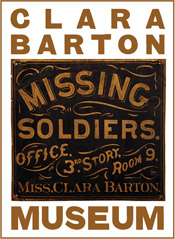
The Widow Maker: How the Pension Office Forced Women to Fight for Survival After the Civil War
March 9, 2017 @ 6:00 pm - 7:00 pm
| Pay What You PleaseEvent Navigation
After the Civil War, thousands of women were left to care for their wounded warriors. These women walked a tightrope between independent decision-making and technical dependence on their invalid male relative. Dr. Ashley Bowen shares the story of one such family and the matriarch’s fight for survival, independence, and justice.
This is part of our “After the War” series. Once a month, speakers will explore how citizens fought to rebuild their lives after the Civil War.
When soldiers went marching home, there was no support system in place to care for their physical or psychological wounds. Instead, the Pension Office provided varying amounts of financial support to each soldier, and expected the women of the house to handle everything else.
The wives of Civil War soldiers were responsible for the “women’s work” of nursing their veterans—shaving their veterans, helping them eat, and bathing them—while also taking on many of the responsibilities that defined a nineteenth century father and husband, including manual labor, financial decision making, and farm management.
When their husbands died, many of these women were told they would not receive their widow’s pension. According to the War Department, by caring for their husbands, the women had proven themselves too independent to need financial assistance.
This talk will focus around one of these women: Virginia Bedor. Her husband, Peter Bedor, fought as private in the 1st Connecticut Heavy Artillery, was arrested for mutiny, fought at Gettysburg, witnessed the fall of Petersburg, and had been treated for acute mania at the Government Hospital for the Insane. Over the course of their nearly forty-year marriage, Virginia raised nine children; nursed her now ill, violent, and temperamental husband; became Peter’s legal guardian; negotiated her husband’s care in jails and asylums; stewarded a Kansas farm to a degree of profitability; and navigated a complicated bureaucratic system to obtain a pension for her husband. When she applied for a widow’s pension after Peter’s death in 1904, the Pension Office refused her request on the grounds that her success as a guardian, farmer, and manager rendered her no longer dependent.
The Bedor’s story, like all family stories, is unique but by no means exceptional. Their correspondence with the Pension Office reveals how late nineteenth century American women negotiated gender relations inside and outside the home, the expansion of asylums and soldier’s homes, and shifting government narratives of the ‘deserving poor.’
Bowen’s research into the Bedor family provides a window into the shifting gender and social service landscape of post-Civil War America. Virginia Bedor’s fight with the pension office makes clear the ways in which the United States federal government’s policies demanded that women present themselves as dependent, deserving widows and incapable of providing for themselves without the aid of a husband or father—regardless of her own success as a caregiver, farmer, and business woman.

